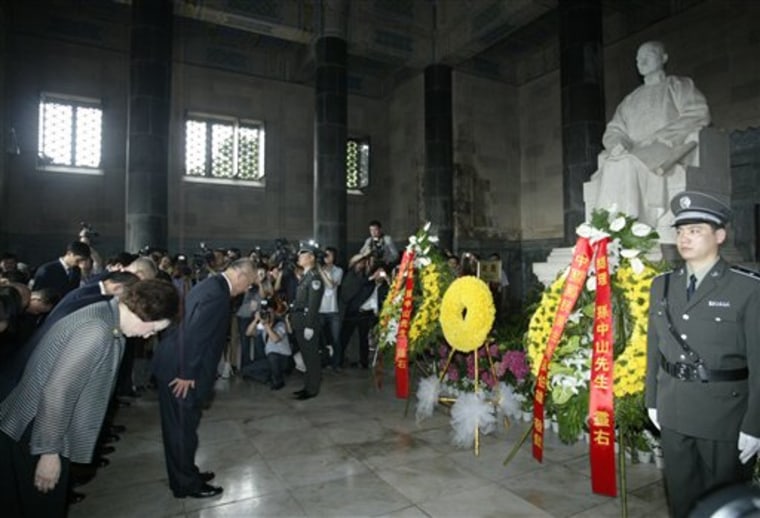The leader of Taiwan's new ruling party met Tuesday with a senior Communist Party official in Beijing, who called for the rivals to peacefully develop their ties through dialogue.
Wu Poh-hsiung's six-day visit to promote economic engagement came on China's invitation.
The chairman of Taiwan's Nationalist Party arrived Tuesday in Beijing for discussions with Jia Qinglin, the fourth-most-powerful person in the Communist Party. Though in the past Beijing has threatened to attack Taiwan if the self-ruled island seeks a permanent break, the rhetoric has become decidedly more amiable since Nationalist Ma Ying-jeou took office as Taiwan's president less than a week ago.
The two sides should peacefully develop relations by shelving their differences and seeking common views, Jia was cited as saying by China's official Xinhua News Agency.
Jia also expressed his support for two of Ma's proposals, which called for direct weekend flights between the mainland and Taiwan and expanding the number of mainland tourists allowed to the island.
In the last century, the Nationalists fought a bloody civil war with the Chinese communists on the mainland. The Nationalists' defeated forces fled in 1949 and settled on Taiwan, separated by a 100-mile-wide strait. China demands unification.
Further warming since March
The ice between the sides was first broken in 2005 when then-Chairman Lien Chan of the Nationalist Party — the biggest opposition party at the time — made a historic visit to China. Relations have warmed further since Ma was elected president in March.
Ma has pledged to seek economic engagement with China and to end nearly six decades of hostility, a platform that played well with voters following eight years of a confrontational approach by Taiwan's last president, Chen Shui-bian. Chen wanted formal independence, a stance that enraged Beijing.
Most Taiwanese reject unification, fearing it would deprive them of their freedoms and compromise their economic prosperity. But Ma has made clear to Wu that he must not discuss the thorny issue of Taiwan's sovereignty or unification during the trip.
Wu first stopped in Nanjing where he paid his respects at the mausoleum of Sun Yat-sen. Both China and Taiwan revere Sun as a hero for his role as a founding father of modern China after the Qing dynasty.
Wu was expected to meet with Chinese President Hu Jintao before traveling to the commercial center of Shanghai, which is home to tens of thousands of Taiwanese business people.
